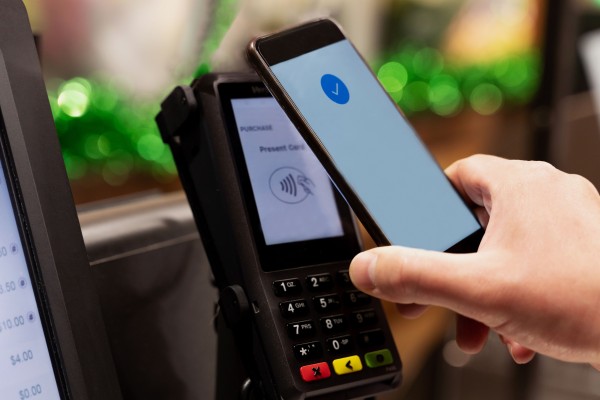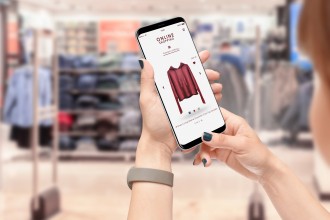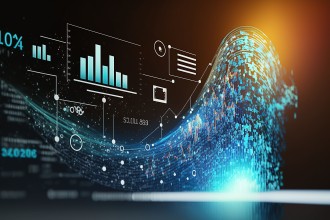-
3.Smart Shelf
-
3.1.Self-Checkout
-
3.3.Last Mile Delivery
-
3.4.Retail Automation
-
3.5.Shelf Compliance
-
What drives us to talk about retail tech? ensun aims to speed up global business progress. Our web crawlers gather data, and our text-based algorithms organize it systematically. By combining our internal data with external sources, we offer insights into the latest technologies and spotlight the top innovators behind them.
For this report, we've analyzed over 1.490+ relevant companies within the health tech sector.
First, let’s clarify what technologies in retail are. eMarketer defines them as “digital software, platforms, and innovations that help retailers manage and optimize their operations. Typically, retail tech is used to improve the CX, increase efficiency, and optimize profitability for retailers.” With this in mind, let’s dive into forecasted developments for these innovations.
With this in mind, let’s dive into forecasted developments for these innovations.
Forecasted Developments for Retail Technologies
The global market for retail automation is set to undergo significant growth. Estimates suggest that the market will almost triple up to $33 billion by 2030, compared to 2021. Highlighting the need for optimizing operations across retail stores, warehouses, and distribution centers. Or simply, aiming to enhance efficiency and elevate the overall shopping experience for consumers.
A report from Comcast has shed light on the ongoing transformations within the retail industry, where a blending of innovative technologies with traditional retail methods is reshaping the overall landscape. One significant area of focus is the concept of the “Store of the Future”. Here, the physical and digital realms merge to create a more efficient and immersive retail environment that benefits everyone. Customers get a more efficient and immersive shopping experience, while employees gain new tools to better and more efficiently serve those customers.
Data from Square further supports this notion, as retailers are increasingly recognizing the need to enhance the in-store experience while also expanding their online presence to reach a broader audience. Underscoring the importance of adopting a seamless omnichannel strategy that caters to the preferences of all generations of shoppers, ultimately driving profitability.
As retail embraces automation and a blended physical-digital experience, businesses see increased efficiency and potentially lower costs. This translates to a stronger economy with the potential for more competitive pricing and product availability. Consumers benefit from a more convenient and engaging shopping experience, impacting their daily lives by potentially saving them time and effort.
Latest Technologies in Retail and Their Top Innovators
Since the impact of economic growth and the fuel it provides for innovation in the industry is now established, what exactly are those innovations? This paragraph is supposed to go beyond typical buzzwords like Immersive Experiences or AI-powered Personalization. Instead, we will try to introduce you to other relevant industry-driven topics, that are gaining traffic, but are not too prevalent in the public eye. All while giving credit to companies who are the top innovators in their field.
So, let's take a closer look at very promising technological trends.
Smart Shelf
Smart Shelves represent a big leap in inventory management for retailers. Leveraging RFID technology, these electronically connected shelves automatically monitor inventory levels, providing real-time data to manufacturers. This real-time data collection empowers retailers with insights into product usage and sales trends, facilitating more informed decision-making in supply chain management.
The adoption of smart shelf technology in supermarkets promises transformative changes across various facets of operations. With digitized price label updates and streamlined inventory management, supermarkets can optimize shelf space utilization and enhance overall operational efficiency. Moreover, the integration of smart shelf technology opens avenues for improved customer service through enhanced stock availability and personalized marketing strategies, aligning retail experiences with the evolving demands of the digital age.
Top Innovators
- CONEX Digital revolutionizes retail with custom digital solutions and real-time analytics, setting a new standard in engagement with their AI-integrated cosmetics display.
- OnDis offers retail products for sales, loss prevention, and customer engagement, detecting movement and sending alerts for real-time insights. Giving retailers access to real-time stock counts and trends with easy customization options.
Self-Checkout
Self-checkout systems revolutionize retail by allowing customers to handle scanning, packing, and payment independently, without assistance. This convenience reduces waiting times and enhances customer flow, while also boosting retailers' sales and revenue by encouraging additional purchases.
However, self-checkout isn't without its challenges. Theft risks, high upfront costs, and occasional customer confusion or equipment malfunctions pose concerns. Nevertheless, many retailers prioritize the benefits of quicker checkout and reduced labor costs, driving widespread adoption. Major players like Walmart, Target, IKEA, Home Depot, Costco, and Kroger have integrated self-checkout systems into their operations to streamline processes and adapt to evolving customer preferences.
Top Innovators
- TRACXPOINT pioneers the retail sector with its Artificial Intelligence Cart, delivering personalized shopping experiences and optimizing operational efficiency through AI and IoT solutions.
- Xplorazzi delivers real-time shelf health reports to ground staff via their mobile app, optimizing SKU performance with insights like Share-Of-Shelf and Out-Of-Stock data.
- ScanWatch improves checkout experiences with Computer Vision, combating losses like warehouse theft. Led by experienced engineers and industry experts, it's compatible with existing hardware.
Customer Data Platform
Customer Data Platform (CDP) is specialized software designed to gather and harmonize first-party customer data from various sources, creating a unified and comprehensive profile for each customer. Its primary use cases include data unification, segmentation, identity resolution, and data management, enabling brands to analyze, clean, and enhance datasets while adhering to regulations like GDPR or CCPA.
By leveraging predictive insights, CDPs empower brands to pinpoint high-value customers and deliver personalized experiences that set them apart from competitors. This personalized approach enhances customer loyalty, retention, and ultimately, Customer Lifetime Value (CLV). Customer data collected by CDPs spans basic, interaction, behavioral, and attitudinal categories, providing a holistic understanding of customer preferences and behaviors.
Top Innovators
- Growthwave Software Solutions pioneers digital consulting, specializing in customer experience enhancement through innovative solutions like Customer Data Platforms.
- RAIS is a top innovator, offering a centralized customer intelligence platform, empowering businesses with data-driven insights for enhanced decision-making.
- Future Mind is a top innovator in digital transformation, crafting human-centered solutions and impactful digital products for leading brands across various industries.
Last Mile Delivery
Last-Mile Delivery is the final segment of supply chain logistics, involving the movement of goods or passengers from a transportation hub to their destination. It's a critical touchpoint where businesses can impress customers with seamless delivery experiences, fostering loyalty and positive feedback. However, managing the increased costs associated with last-mile delivery can pose challenges for companies.
An example of last mile delivery is when a package travels from a distribution center to a consumer's doorstep. Here, a carrier retrieves the package from the warehouse and delivers it to the specified address. Throughout this process, consumers often receive SMS updates detailing the package's location and estimated arrival time, ensuring transparency and convenience.
Top Innovators
- Fleetroot pioneers last-mile delivery solutions, merging advanced technology with personalized approaches, revolutionizing transportation through connection, orchestration, and automation.
- SKUBIQ innovates warehouse management with a unified SaaS platform, integrating seamlessly with various applications to serve SMBs, ecommerce, and logistics companies globally.
- Point Pickup stands out for providing retailers with a same-day delivery service, backed by data-driven predictive technology, ensuring unparalleled customer satisfaction and nationwide coverage.
Retail Automation
Retail Automation involves self-service kiosks that operate independently, replacing traditional retail services with software integrations. In today's fiercely competitive retail landscape, AI and automation are vital for growth and innovation. Retailers are increasingly turning to these technologies to address challenges such as inventory management and shifting consumer preferences.
Automation offers advantages like enhanced efficiency, cost savings, and increased safety. However, it also brings technical challenges, reduced human interaction, and potential limitations in customer experience. Despite these concerns, automation provides scalability, flexibility, and opportunities for operational streamlining.
Top Innovators
- Endoxa revolutionizes retail automation with EndoxaFlow, a leading productivity software empowering business to streamline processes and enhance collaboration, exemplified by Pick n Pay's B2B e-commerce platform.
- DynamicPricing AI’s technology optimizes retail pricing by leveraging data-driven strategies to adjust prices based on real-time demand, competition, and inventory, resulting in increased revenue, margins, and accelerated sales cycles.
- Dakoza, a subsidiary of VDAF, pioneers retail automation software, servicing various retailers and ecommerce giants like Amazon and Walmart.
Shelf Compliance
Shelf Compliance consists of various display units and fixtures used by retailers and suppliers to showcase merchandise for shoppers. Planogram compliance refers to adhering to a specific layout of products on store shelves, though its definition varies depending on retailers' objectives and success criteria. Maintaining on-shelf availability boosts sales, builds brand loyalty, and enhances customer satisfaction by ensuring products are easily accessible.
Using a shelf company offers benefits like quicker business establishment, instant credibility, and fewer customizations. However, hidden liabilities and the significant upfront investment required, especially for older companies, should be considered. In the consumer products industry, Share of Shelf Intelligence analyzes a brand's prominence on store shelves compared to competitors, assessing factors like placement, space allocation, and visibility to gauge market presence and competitiveness.
Top Innovators
- LEO GRC is a relentless force in quality and innovation, dedicated to simplifying processes and driving talent and organizational transformation for clients.
- SES-imagotag, a trusted partner for retailers, leads in smart digital labels and pricing automation, offering comprehensive IoT solutions for enhanced in-store operations.
Navigating Technological Evolution
In summary, the retail sector is undergoing a transformation driven by technologies like smart shelves, self-checkout systems, customer data platforms, and omnichannel strategies. These innovations aim to enhance efficiency and customer experiences, forging a more interconnected and adaptable retail landscape for businesses and consumers alike. But retail is not the only field evolving. Our B2B search engine unveils you suppliers for the exact technology you are looking for – globally and inter-industrial.
Start searching here now.
FAQ about Retail Technologies
Retail stores are embracing technology to create a smoother shopping experience for customers. This includes using systems to manage inventory efficiently, streamlining checkouts, and leveraging data to personalize marketing and product recommendations.
The rise of tech in retail is fueled by two key factors: customers' desire for a smooth experience, from mobile shopping to self-checkout, and the ever-changing retail landscape. This forces retailers to adapt and compete with online giants, all while embracing new technologies like AI for personalization.
Technology is a double-edged sword for retail. It offers advantages like a smoother customer experience and improved efficiency, but also has drawbacks like job displacement and data security concerns. Overall, it's an advantage for retailers who can leverage it effectively.
Automation is crucial in retail for several reasons. It increases efficiency in tasks like inventory management and order fulfillment, reducing costs. Automation also improves accuracy and frees staff to focus on customer service.
AI and automation are a game-changer for retail businesses. AI personalizes recommendations, optimizes pricing, and automates tasks like inventory management. This frees up staff, improves customer experience, and boosts sales.
Quickscout
Auf der Suche nach
passenden Lieferanten?
Beginne jetzt mit unserer KI-basierten Lieferantensuche!





